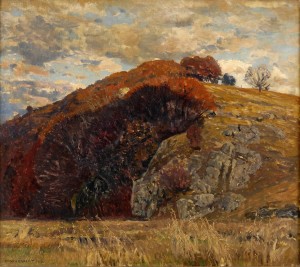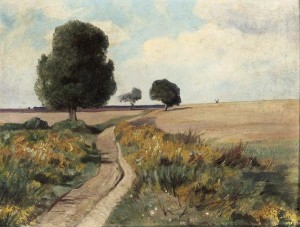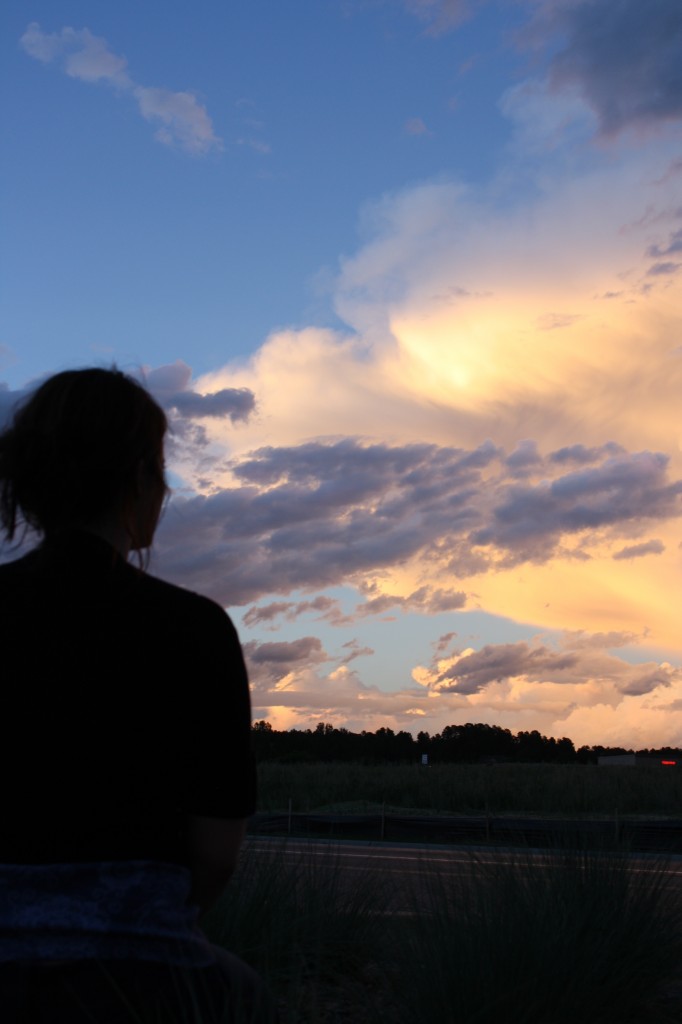Almost there?
 The first real storm of autumn churns in the air tonight. The shadow and toss of it has gathered all day and the sky heaves and shifts now with the weight of rain. It's coming is a gladsome thing. The birds are all crying, not a warning, but a high symphony of welcome to this season of chill and fire, of ripened fruit and slow, sweet death. They flit in the air at the feet of the storm, black darts in giddy leaps through the mist and the scurry of a wind so swift it seems to lose its breath and have to catch it now and again. I watch it all from my front porch, and the scent of storm and woodsmoke and summer's end is heady in my nostrils. The air is filled with the song of change and I lift my face to meet it.
For against all expectations, I am back in Colorado, home to greet the turning of the year. Surprising, no?
The first real storm of autumn churns in the air tonight. The shadow and toss of it has gathered all day and the sky heaves and shifts now with the weight of rain. It's coming is a gladsome thing. The birds are all crying, not a warning, but a high symphony of welcome to this season of chill and fire, of ripened fruit and slow, sweet death. They flit in the air at the feet of the storm, black darts in giddy leaps through the mist and the scurry of a wind so swift it seems to lose its breath and have to catch it now and again. I watch it all from my front porch, and the scent of storm and woodsmoke and summer's end is heady in my nostrils. The air is filled with the song of change and I lift my face to meet it.
For against all expectations, I am back in Colorado, home to greet the turning of the year. Surprising, no?
Three weeks ago, neither I nor anyone else thought I would be here. School is where I thought I'd be. Nose pressed into textbooks. Feet on the run to classes, fingers scratching notes as a new life settled round me. Wheaton, I'll begin by saying, is a grand place in which I met nothing but kindness. My leaving has nothing to do with the school itself. Nor have I lost my desire to learn, to teach, to write in and of the realms of story and imagination. But I got to Wheaton, arrived from the scurry of a too-swift life into the stillness of a new one. And the silence gave me time to think, to pray, to count the cost of what I was choosing. This was no side path or jaunt of a trail to distract my restless self. This was a parting of the ways, a departure from the way of ideals that I have walked for almost twenty years. Two roads, I found, diverged in the yellow wood of my soul, and I found I wasn't sure which one I ought to take.
How to explain? I'll start with a question.
“Are we almost there?”
It was the question my siblings and I always asked at the end of our family road trips. Muscles strained taut against the seat belts, our small faces anxious in the swift darkness of the car, we asked this when we felt we could not bear the car any longer. Mine was a traveling family and we children knew both the delights and the desperations of days spent in the backseat, mountains or meadows in a spectacle out the window, our books and car-only toys spread over our knees. But the last leg was always the hardest. Often, it was at night, and the sky out our back seat window would press in on us, a vast, black, blank face that frightened us, its breath chilling the glass against our small, hot faces. Tethered to our car seats, our eyes unable to mark any known thing in the dark lands outside, something like panic would seize us and one of us would hurl that question forward in a voice tinged with fear.
“It’s okay sweetheart,” my mom would say, and though we could not see her face in the shadow, her voice always came like starlight, brightening the darkness, “we’re almost home.”
Home. The very word, once spoken, gentled us. It was a word that set itself in our minds like a story, bearing within itself more than the mention of a mere dwelling place. My family moved twelve times before my eighteenth birthday, so you might think that the idea of home would be something beyond my reach. But it never was. For home was not just a place. Home was the story of us. Home was the history of our love, the record of our many celebrations. Home was the way we Clarksons lived our days, in rounds of books and cups of tea and candlelit discussions. Home, to us in the car that night, meant our own beds and Dad’s music strumming us to sleep and reading time on the couch with tea the next morning.
In the midst of that fluid back seat darkness, we knew ourselves named and held by the life to which we were going, the story awaiting our return. We leaned back and noticed the stars for the first time. We were no longer afraid.
 Twenty years later, a traveller on a different sort of journey, I've asked myself that question more often than I like to admit. Am I almost there? Have I arrived at the self and life I yearn to find? I feel in myself the same restlessness I felt as a child when the journey had grown too long. I have moved through my life in the past ten years on quest for a place of belonging. But finding my place on earth is difficult because of the ideals I bear with me. I carry hopes formed by a history of family love, dreams made by the knowledge of what home can be. I carry the image of a certain kind of life marked by quiet, by fellowship, by love of all that God has created. I walk with ideals of beauty, of God's life enfleshed in every atom of existence and I bear the dreams of artistry. I hope to create a story that images all I hold to be best and most true. Like tiny, golden seeds these holy yearnings rattle about in my heart as I search for the right place to plant them. But after a decade-long journey, I cannot answer my own heart's cry. Are we almost there? I've have idea.
Twenty years later, a traveller on a different sort of journey, I've asked myself that question more often than I like to admit. Am I almost there? Have I arrived at the self and life I yearn to find? I feel in myself the same restlessness I felt as a child when the journey had grown too long. I have moved through my life in the past ten years on quest for a place of belonging. But finding my place on earth is difficult because of the ideals I bear with me. I carry hopes formed by a history of family love, dreams made by the knowledge of what home can be. I carry the image of a certain kind of life marked by quiet, by fellowship, by love of all that God has created. I walk with ideals of beauty, of God's life enfleshed in every atom of existence and I bear the dreams of artistry. I hope to create a story that images all I hold to be best and most true. Like tiny, golden seeds these holy yearnings rattle about in my heart as I search for the right place to plant them. But after a decade-long journey, I cannot answer my own heart's cry. Are we almost there? I've have idea.
We live in a time that doesn't look with kindness on quiet, on wonder, on the kind of life that is like a seed planted in the soil of love. We live life increasingly alone as we hurry and text and keep up the race. Fellowship is hard to find. Peace is hard to catch. And writing, the writing life, let me tell you, is a battle in itself. Modern life stares us down with its vast blank stare, and makes us wonder if we are worth its notice. In the past year, I wasn't so sure I was. I began to listen to the voices of my time urging me to strive, to run, to reach, always for more; achievements, experience, freedom (from what, I’m not sure). The mandate of this age seems to be to grasp, and when loneliness thickened my throat and ached behind my eyes, I began to think I needed to grasp something beyond the struggle of living my ideals. Hope in their impossible beauty was simply to much to bear. I began to react, instead of contemplate. I lived swiftly; I worked, traveled, moved in order to ignore my growing sense that I would never belong. In this milieu of self, I turned toward college, a choice that offered me definition and a place. And I chose it from the midst of a whirlwind and I arrived from out of the storm.
But in the sudden quiet of my new life, my heart finally began to speak. On the first day of classes, I sat down with a checklist of general credits that I would need in order to graduate. I set out the financial statements. I planned the years. And I was met with an abrupt comeuppance. At nearly thirty years old, with some of the most productive years of my life ahead, I was about to begin an investment of self that would set me on a certain road for the next decade of my life. An academic life is a good one, a sure one, and I knew I could be a good student. But I realized that to choose that life, to invest my money, my time (more precious at this point), my mind into school was the choice to enter a good life, but one entirely opposite of the rooted, natural, creative life for which I had always hoped.
Until that moment, I had lived so swiftly that I existed in a mental blindness that kept me from counting the cost of my decision. I finally did, and I asked myself again: am I almost there? Again, I could not answer. So I asked, what does "there" mean after all? A vague sense of success? A paying job? Enough self-respect to stare down the questioning world? An escape from loneliness? A secure career? In the silence of that moment, my heart answered no to them all and I sat at my desk, lost and unravelled of soul. What then?
“We’re almost home…”
My mother’s old words echoed suddenly in my mind, the instant answer to that childhood question. Home. The very thought of it gentled me. And the word was more than itself, for it set me back inside the story of those who have loved me and the dreams we held together that formed me into the woman I have become. My mind was flooded with images as I began to pray. Memories first, of feasts with my family, of the books we have read and the late-night talks that have formed the convictions I bear like gems in my soul. Of the quiet I have known in the mountains, of the music I have made with siblings, the memories with friends. Of days spent in carving out a story, word by word, whose form could speak the beauty I knew. The hopes I have kept of a house and land that could one day be a refuge, of a rooted life, in which fellowship grew year by year. Of a life lived in a rhythm of creativity and rest, stories told and meals made, music played, and a house made slowly into a sphere of wonder, a refuge for the lost in heart.
That day at my desk, the memories within me reached out to tell me who I was, to name me, and even, I realized, to beg my return. The history of those who have loved me and the dreams that have shaped me are seeds within me, a compact, golden story that has not withered or faded in all my wandering. I realized, in that moment, that I would never arrive, never get "there" until I chose to plant that seed myself. Home was a story begun with me by love, but home was also something I needed to make by my choice. Roots come to those who choose to stay and work and give. For too long, I have let the winds of culture, the storms of my own insecurity and fear drive me away from the life I desired. Writing is hard, hard work and I let my self-doubt drive me from my craft. Belonging seemed beyond my reach so I tried to change myself to fit a more acceptable form. Fear ruled my heart and I let myself be lost.
But now I choose to be found. I choose to assent to the life I have been given, and for me, that means a life that is faithful to my ideals. I must accept the love I have been given, the dreams that are my inheritance, and the limitations of loneliness, of work, of sorrow that sometimes accompany them. I can plant my life in the soil of love and water it by my own faithfulness. I can sow in faith, and cultivate in hope. I don't need a degree to sow my seeds of words in books and essays, to speak what I know about imagination, to write what I've seen of beauty. I choose to come home. To make home. To plant the story of all that I am in the soil of the love that began it. I choose to live by hope, rather than certainty. To plant my dreams and trust that they will grow, and to stay long enough for the harvest.
That is the simplest explanation of my choice.
From afar, the choice may seem abrupt or strange or even wrong. I understand this. Interior journeys sometimes break into the outer world with a suddenness that belies their intricate history. College is a lovely choice and the people at Wheaton were wonderful. But that is not the story I feel I must live and the peace of that knowing has marked every step of this change. My love for imagination, my yen to study has not ceased. But right this minute, I can learn, read, study, even teach. And goodness, I have plenty to do. I always have, if I had only noticed. I am at work on the books I set aside in my wandering. I am writing with my mom, we are weaving messages together, planning a new set of talks about the incarnational life. I am writing my talks on imagination. I'm developing a line of children's books... quite the exciting announcement to come. I've picked up my Scottish story again, and I'm working on a series of blog posts about my favorite topic... ideals. But I am also cultivating quiet here in the autumn air. Watching the earth in its slow, sweet turn. Listening to those I cherish. Savoring the quiet ways of love.
In the end, am I almost there? Yes, I think I am. At least, I'm well on my way.


